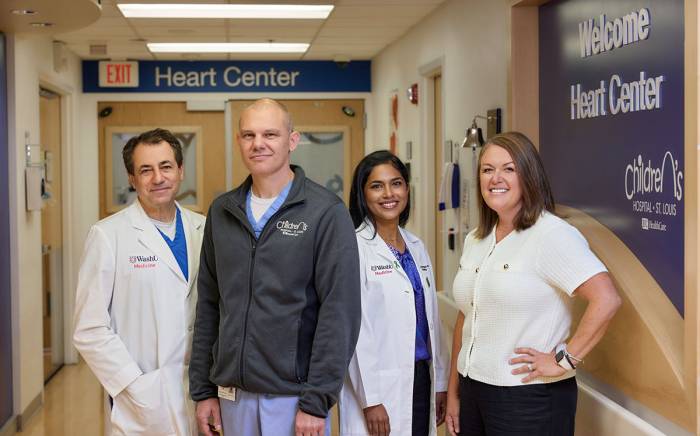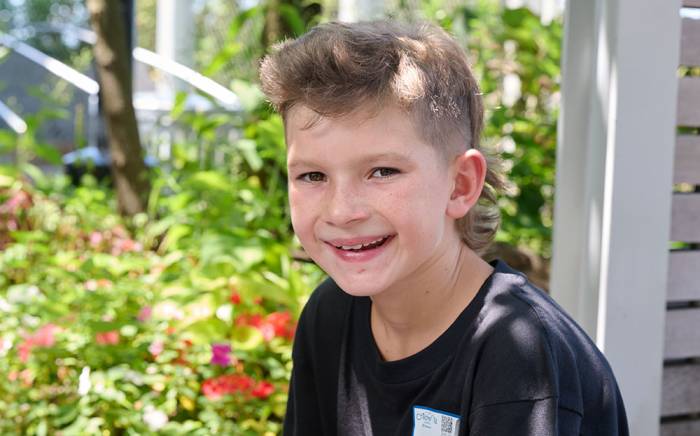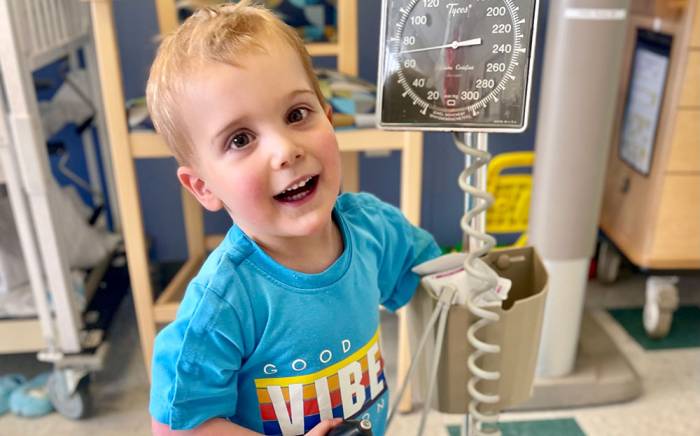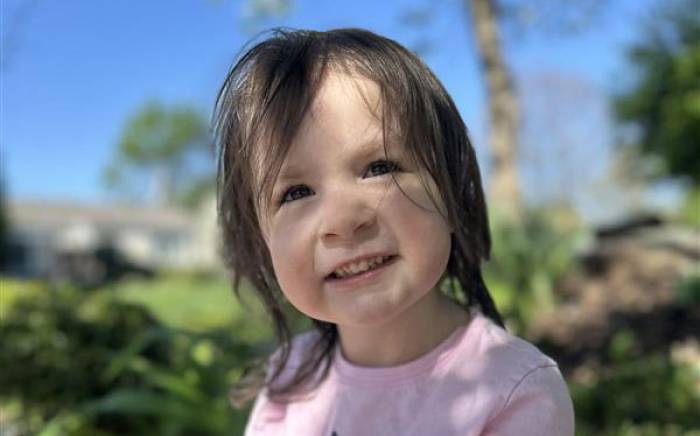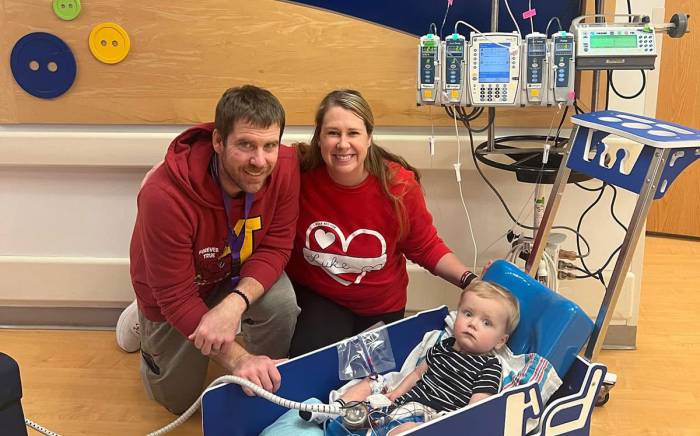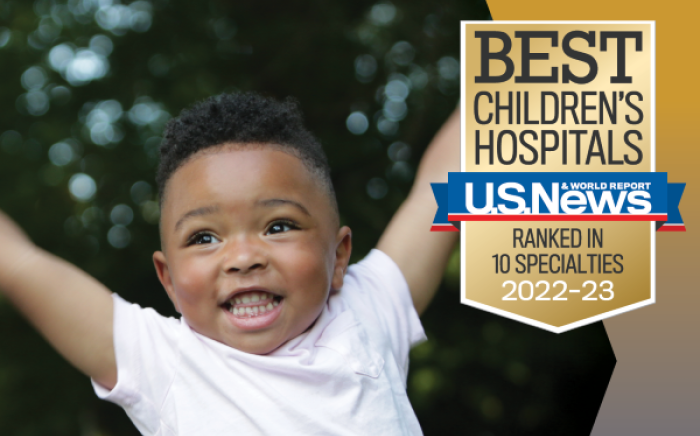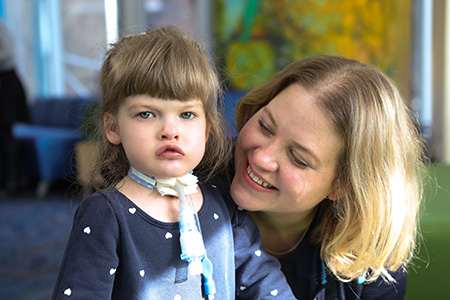 As first-time parents, Kali and Patrick Bowman, of Springfield, Missouri, have learned more than their fair sure about caring for and making difficult decisions for their child.
As first-time parents, Kali and Patrick Bowman, of Springfield, Missouri, have learned more than their fair sure about caring for and making difficult decisions for their child.
In April 2014, when Kali was 32 weeks pregnant, a fetal echocardiogram at St. Louis Children’s Hospital showed her baby had a severe heart defect.
Two weeks later, Kali went into pre-term labor and was airlifted to Barnes-Jewish Hospital. After four weeks bed rest, baby Ellie was born and transferred to the newborn intensive care unit (NICU) at St. Louis Children’s Hospital.
The extent of Ellie’s heart defect became more clear after she was born. She was diagnosed with tetralogy of Fallot, a combination of congenital heart abnormalities that includes pulmonary atresia and major aortopulmonary collateral arteries (MAPCAs), among other defects.
At 10 days old, Ellie had respiratory arrest and spent the next three months in the Cardiac Intensive Care Unit, part of the St. Louis Children’s and Washington University Heart Center.
The Heart Center is the largest in the region, caring for nearly 5,000 pediatric patients over the past 10 years.
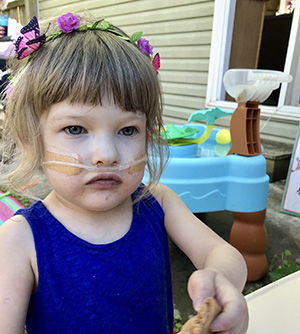
Ultimately Ellie was diagnosed with DiGeorge Syndrome, also known as 22q11.2 deletion syndrome, a disorder caused when a small part of chromosome 22 is missing. This syndrome was the root of Ellie’s heart defects, cleft palate, adrenal insufficiency and developmental delays. Ellie had a difficult road ahead of her.
Persevering Through Challenges
Over the next four years, Ellie had three open heart surgeries at Children’s Hospital and was the hospitalized numerous times with respiratory illnesses and other issues. In addition, she had a cardiac catheterization in St. Louis every couple of months.
As a respiratory therapist, Kali recognized the realities of Ellie’s condition.
“It has been a blessing and a curse being an RT,” Kalie says. “Ellie had a tracheotomy and was on a ventilator. It’s nice because I’m familiar with it as part of my job. But it was scary as a mother.”
In 2017, Ellie was diagnosed with pulmonary hypertension. “Until then, I thought we could just repair Ellie’s heart by closing the hole in her heart,” Kali says. “Instead they found the pressure was high in her lungs and heart. Then she was hit by influenza and pneumonia that winter.”
In April 2018, Kali noticed Ellie’s feet were swollen. An emergency echocardiogram showed Ellie’s left ventricle wasn’t functioning. The family sped to Children’s Hospital where Ellie was diagnosed with severe heart failure.
After 12 days in the hospital, the family went home to Springfield with more than a dozen medications and oxygen. “We were hopeful Ellie might have one to two years to live by managing her heart failure,” Kali says. Unfortunately, time wasn’t on their side.
By June, Ellie was airlifted to Children’s with a rhinovirus. At the same time, her heart function was quickly declining. A month later, Ellie was on the transplant list.
Finding Hope Through a Phone Call
The family settled in for a long stay in St. Louis. Ellie needed a heart-lung transplant to survive but the road wouldn’t be easy. Kali and her husband, Patrick, struggled with the decision about a transplant. “At first, we didn’t want to put Ellie through it,” Kali says. “I was overwhelmed and it was a very emotional time for my husband and me.”
St. Louis Children's Hospital has performed more than 400 lung and heart-lung transplants since 1990, making it the most experienced pediatric lung transplant program in the world. The hospital’s transplant surgeons also performs lung transplants in conjunction with surgical repair of complex heart defects that cause pulmonary hypertension.
In May 2018, St. Louis Children’s Hospital performed a heart-lung transplant on a baby who was 5 months old, the youngest patient to undergo this surgery in more than a decade. Combined heart-lung transplants are so rare in children that only two were performed in the United States in 2018. The last successful heart-lung transplant in the U.S. also took place at St. Louis Children’s in 2017 for 15-year-old boy.
After just four weeks on the transplant waiting list, Ellie’s condition quickly deteriorated. “We were thinking about having to let her go,” Kali recalls. “She was in the Cardiac Intensive Care Unit, and maxed out on medications and IVs. Everyone was preparing us for the worst.”
Then came the “miracle call” on Sept. 22, 2018. “On Friday night, we were thinking about her funeral and by Saturday night we were prepping her for the transplant,” Kali says.
After receiving a new heart and two new lungs, Ellie woke up smiling, Kali says. “I knew right away she felt better. Since then, she has had more energy than she ever has in her life, her color is better and she is finally starting to gain weight and outgrow her clothes. She enjoys doing things like swinging that she never enjoyed before. It’s pretty amazing.”
Ellie was discharged just after Thanksgiving 2018 and the family spent the next two months staying near the hospital in St. Louis. The Bowmans went home to Springfield Jan. 25, 2019.
Ellie’s improvement since transplant has been dramatic. Before her transplant, her walk test showed Ellie could only walk 90 feet in 6 minutes and her oxygen dropped to 59 percent. After transplant, she walked 720 feet and her oxygen stayed above 95 percent.
“It’s nice to be home and is so good to see Ellie playing and doing well,” Kali says. “On a recent warm day, Ellie was riding outside on her bike, one of her favorite things to do. She is also enrolled in preschool and is going to be so excited to see her favorite teacher again once school starts.”

